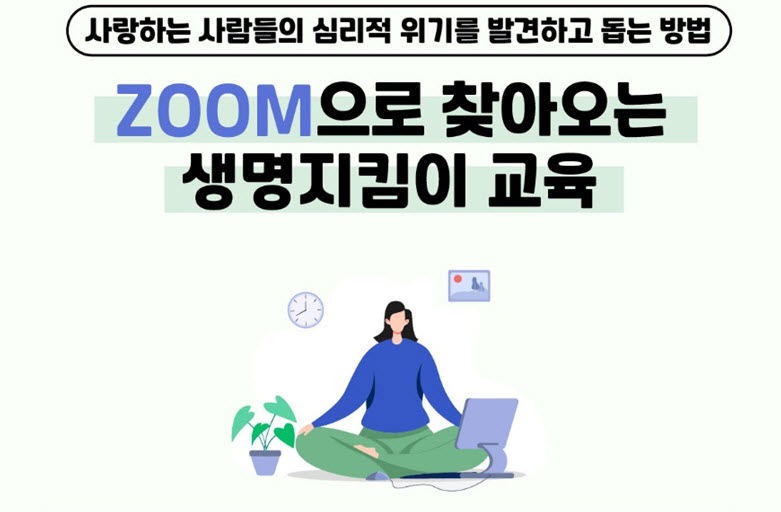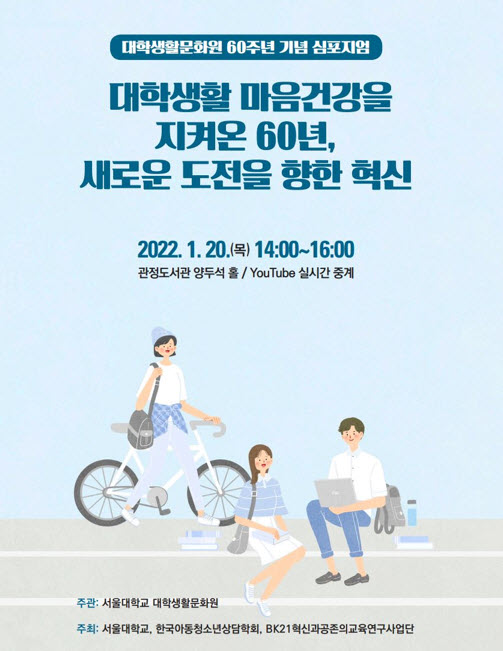Since the prolonged COVID-19 pandemic, the number of students suffering from mental health issues has been on the rise. As a means to tackle this problem, the SNU Center for Campus Life and Culture (CCLC) hosted a training session on how to maintain mental health and prevent suicides. The session was held via Zoom on November 19, 2021, and CCLC counselor Subin Lee was the main speaker. The event was open to every member of the university.

Zoom Training Session on Psychological Crisis
Understanding the Symptoms of Psychological Crisis
The main objective of the training was to enhance the attendees’ ability to recognize and respond to the mental health issues of their peers. Participants learned the signals that are typically reported before suicidal attempts. Lee explained that if a friend frequently talks of suicide, researches specific methods of committing suicide, or is overly dependent on alcohol, we should be concerned about their mental health.
Lee emphasized that it is resisting indifference that can make a difference. We should pay attention when someone exhibits symptoms and be attentive listeners. It is also crucial that we encourage them to seek support from a mental health professional, an example of which is SNU Call (02-880-8080). SNU Call is a 24/7 hotline that provides free psychological counseling to members of the SNU community, a convenient and effective option for those in need. While it is common to want to help a friend who is having a hard time by offering advice, Lee cautioned against this. “It is enough to simply recognize the symptoms and refer them to an expert, and let the professionals take it from there.”
SNU CCLC: Sixty Years’ Contribution to Student Welfare
The SNU CCLC, the host of the training session, marked its 60th anniversary in 2022. In celebration of this, the Center hosted an online symposium on January 20. Professor Kim, Dongil (Department of Education), the Director of the CCLC, recounted some of the Center’s major achievements.

The 60th Anniversary Symposium of CCLC
The first mentioned of these was the CCLC’s consultative services. In addition to a one-on-one weekly counseling program for faculty and students, the Center also offers free psychological tests, including the Myers-Briggs Type Indicator (MBTI) and the Temperament and Character Inventory (TCI). Brief analysis sessions following these tests have helped students and staff to design career paths that harmonize with their temperament.
Professor Kim next described some of the steps that the Crisis Counseling Division of the CCLC has taken to address psychological crises on campus. A major part of this effort is the prevention of suicide through education. The Crisis Counseling Division has also held regular conferences with professional institutions to analyze cases of campus suicide attempts, and has used its Survivor Connection program to aid those who have survived attempted suicide in social reintegration.
Finally, Professor Kim discussed how the Competence Development Division of the CCLC has been helping students to reach their full potential by offering programs that promote personal and interpersonal growth. One such program is “Burn-out Free,” where students get together in small groups to learn techniques for managing stress through the Mindfulness Based Stress Reduction (MBSR) method. Students who would like to enhance their networking skills can take part as mentors in either the Campus Mentoring Program (CMP) or the School-life Mentoring Program (SMP). CMP and SMP mentors give academic and emotional help to first-year students. While CMP mentors focus on domestic students, SMP mentors give advice to international students. Since 1962, the CCLC has pioneered promoting the mental health of SNU students. In this age of Covid fatigue and social unrest, the value of the CCLC has never been greater.
Source: https://www.snu.ac.kr/snunow/snu_story?md=v&bbsidx=134693
Written by Seunghwan Oh, SNU English Editor, ascendhwan@snu.ac.kr
Reviewed by Professor Travis Smith, Department of Asian Languages and Civilizations, tlsmith@snu.ac.kr

